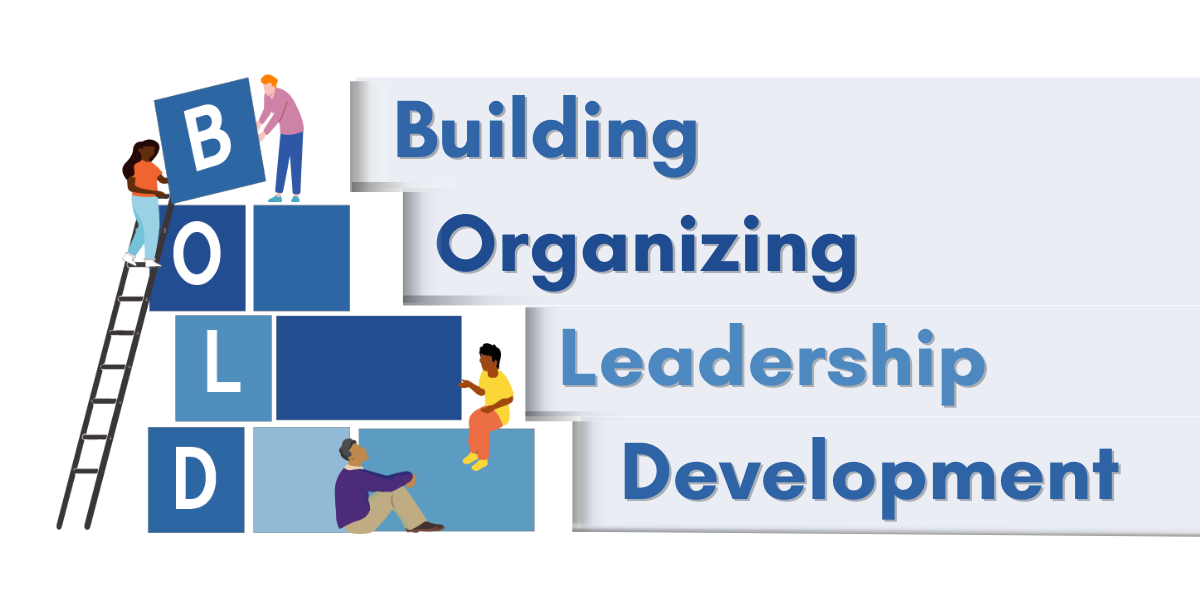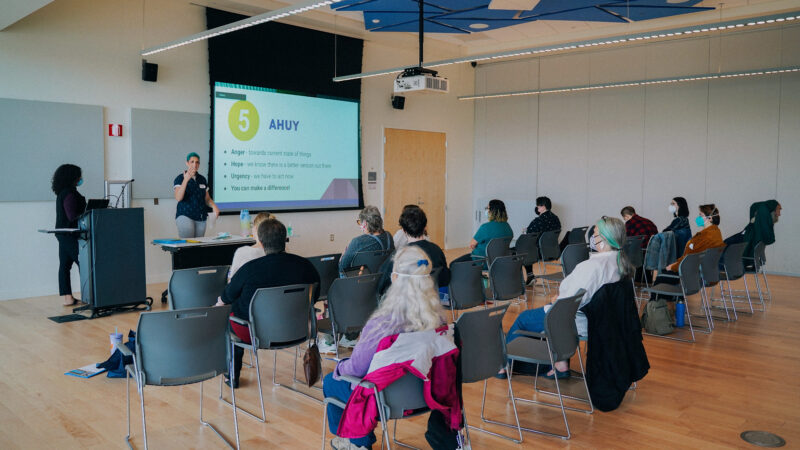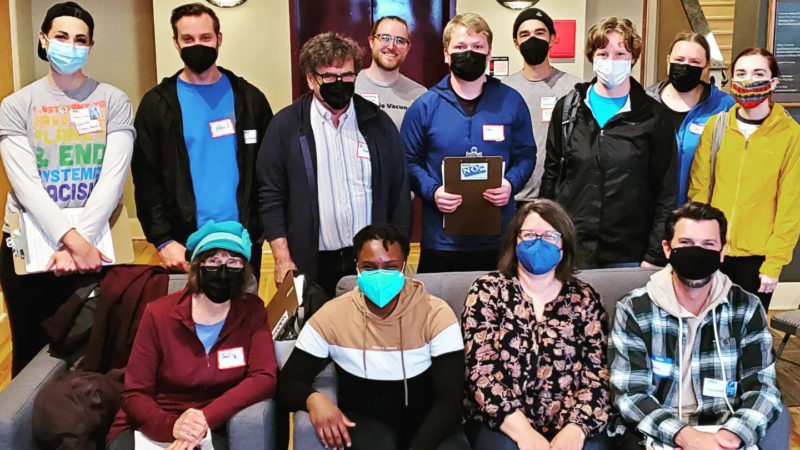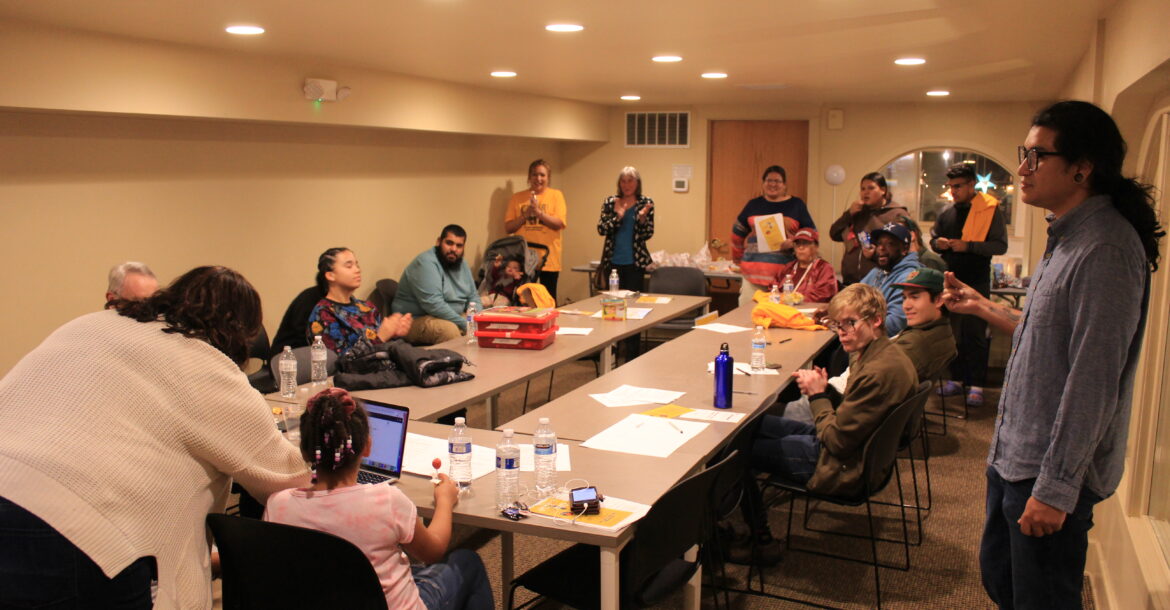Together we challenging racism and poverty in Spokane County!

Welcome to Building Organizing Leadership Development (BOLD)!
Building, Organizing, Leadership Development aka BOLD is a grassroots initiative founded and supported by local community organizations like the Peace and Justice Action League of Spokane, Spokane Community Against Racism, Asians for Collective Liberation in Spokane, Spectrum Center Spokane, and others who are committed to advancing racial and economic justice in Spokane. Together, we are building a shared analysis to bring focus to the root cause of the issues that directly impact our community, identifying solutions that truly build community safety and wellness, and mobilizing everyday people to take action.
Table of Contents:
About BOLD
Together, we are building a shared analysis to bring focus to the root cause of the issues that directly impact our community, identifying solutions that truly build community safety and wellness, and mobilizing everyday people to take action. This can be split into two parts: learning and taking action!
FIRST:
We build a shared analysis of race and class
 First, we come together for a full one-day BOLD Workshop to build a shared analysis, practice race-class narrative, learn about intersectionality and transracial solidarity, and strengthen our organizing skills. This one-day workshop aims to build our collective ability to address racism and poverty in Spokane County by increasing the amount of people taking action together.
First, we come together for a full one-day BOLD Workshop to build a shared analysis, practice race-class narrative, learn about intersectionality and transracial solidarity, and strengthen our organizing skills. This one-day workshop aims to build our collective ability to address racism and poverty in Spokane County by increasing the amount of people taking action together.
We do this through a carefully curated educational curriculum compiled from trusted sources, relationship-building activities, videos, group discussion, and much more . Facilitated by past BOLD participants, this workshop brings us together to learn how select politicians and people in power try to divide us through false narratives around race and class, and how we can combat and counter those narratives.
This workshop was originally based on the Race Class Academy by Ian Haney López. Although the Race-Class Academy remains a large influence to our curriculum, we continue revisiting the curriculum after each cohort to incorporate new feedback from participants and ensure the content meets the specific needs and contexts of our Spokane community. So – if you’ve been through a BOLD workshop before, we encourage you to keep coming back – this program is ever evolving and participants walk away with new knowledge and understanding each time!
Follow us on Facebook and Instagram so you don’t miss our next BOLD workshop!
THEN:
We act on what we learned, together.

Then, we use our education for action! We ask participants to commit to coming back and have activating conversations with our Spokane neighbors through tabling, phonebanking, canvassing, and text banking. By talking with others we are able to bring more people into our movement against oppression, increasing our grassroots power!
This is not persuasion work, this is activation work. We can come together to reject racism and make sure our government works for all of us, of every race and color. We can fight back and win! In order to do that, we need a shared analysis and understanding of race and class oppression. We believe the best way to create a shared understanding is to talk about it – yes, that is BOLD!
The community organizations involved in BOLD are all committed to a race-class analysis of injustice, and fighting that injustice in some way. We hope to connect our community with a variety of opportunities to join that fight. Last year, for example, our community mobilized to defeat Measure 1 – a Spokane County ballot initiative that would have doubled our county carceral system. You can learn more about the campaign at JusticeNotJails.Vote
Graduates of the BOLD Academy will have many opportunities throughout the year to practice putting their Race-Class Analysis into action. Follow us on Facebook and Instagram to learn about our next BOLD Academy offerings!
Our BOLD Philosophy
In Spokane County, we are in a constant struggle. We struggle to create safety and wellness for all of our communities – making sure we all have access to fair wages, affordable housing, affirming and culturally appropriate healthcare, and overall resources while also creating a safe space for collective joy and grief, cultural expression, and celebration.
Why is it a constant struggle?
Select politicians and wealthy elites have learned that, if they can make us afraid of each other, they can use that fear to keep us from coming together and using our collective voice to advocate for what is truly in our best interest. We become distracted with in-fighting and fear which allows them to pass legislation and make decisions that advance their own political careers and financial gains.
How do they do this?
Through coded language called Dog Whistle Politics. Dog Whistle Politics is a strategic communications tactic that – although not explicitly racist or prejudice – calls upon tropes, stereotypes, and harmful characterizations of groups of people. These biases are taught and reinforced in us through our schools, social systems, media, and more. When unchecked, these subconscious messages can influence our behaviors and lead us to, often unknowingly, act upon that prejudice and discrimination.
Calling on this subconscious or “implicit” bias, makes us afraid of each other. We “other” each other – thinking we are so different that we couldn’t possibly want, need, or deserve the same things. This eliminates the possibilities of transracial and class solidarity. It makes it feel like we have more in common with wealthy elites than we do with each other. But that is NOT TRUE!
What does this look like in Spokane?
Sadly, there are many examples. In Spokane, we have seen select politicians try to make us believe that jailing people is the only way to achieve safety. They make baseless claims that people who are unhoused are dangerous and pay police to arrest people for camping in city limits. All while ignoring the disproportionate arrests made of people of color, predominantly Black and Indigenous folks. This coupling of blaming unhoused and low income people and ignoring the explicit racial bias in policing is one example of how select politicians use coded racist and classist rhetoric for political gain.
Instead of helping us help each other, they make us afraid of each other. And for what? So they can keep their wealthy donors happy, keep their seats of power, and avoid any responsibility for creating a truly safe and well community for us to all live in.
Another way we see racism and classism weaponized in Spokane is through our jail system. Over policing and high bail costs keep people of color, predominantly Black and Indigenous, and low income people incarcerated. This is yet another system that is fed through politicians making the wrong choices for our community–like trying to build a new jail instead of investing in programs and resources for community health and wellness.
Why is it important for us to create a shared analysis?
A shared analysis gives us a framework to sift through misinformation and fear-mongering messages and identify root causes of the issues that are impacting our communities. It connects us on our shared values and shared assumptions so we have a strong foundation to build collective action.
What happens when we come together with that shared analysis?
One of the best and more recent examples is the “No on Measure 1” campaign of 2023. In 2023 our community faced another of several attempts that have been made to expand our Spokane County Jail. Select politicians used misinformation and mischaracterizations to avoid addressing what the actual data shows: that there is harsh discrimination against Black, Indigenous, and other people of color and low-income folks in our Spokane County Jail system.
Proponents of the new jail thought if they could plant seeds of fear and make us afraid in our own communities and present a new jail as the way to safety, then they could appeal to their constituents by appearing “Hard on Crime”. Sinking our tax dollars into another facility despite the proven success of programs and resources that center community health and wellness is the same pattern we have fallen into time and time again. “Hard on crime” often translates to hard on communities of color and low income communities–by using a shared race-class analysis we can see these initiatives for what they truly are!
Together, with the leadership of the Justice Not Jails political action committee (PAC), we defeated Measure 1. We came together, across race and class, to advocate for our communities. Grounded in our shared values, we agreed that a system designed to disproportionately incarcerate people of color and low-income folks is in nobody else’s interest but the wealthy few who profit from it. It is absolutely not in the best interest of our community.
We agreed that what we want to see for our community and what would truly build community safety and wellness is access to healthcare, affordable housing, mental health care, substance use treatment, and much more.


The Measure 1 campaign of 2023 is a prime example of what we can accomplish when we use a shared analysis to speak about issues that directly impact our community and draft solutions that truly build safety and wellness. That is exactly what we are trying to do with BOLD.
Together, we build and sharpen a shared analysis that helps us talk about the issues that impact our people. A shared analysis helps us recognize what questions we need to ask to understand the heart of the issues our communities are facing, and, with that understanding, we can advocate with precision and tact to build solutions that truly advance safety, wellness, and justice.
Frequently Asked Questions:
Why are we talking to people about racism and poverty?
Should I sign up for the BOLD Workshop?
Why does the BOLD workshop include race-based caucusing?
What if I don’t know which caucus to join?
What happens after the BOLD workshop?
I feel uncomfortable talking with community members about racism and poverty. What should I do?
I don’t think I am ready for BOLD, what resources are available?
What is BOLD?
Building, Organizing, Leadership Development aka BOLD is a grassroots initiative founded and supported by local community organizations like Spokane Community Against Racism, Asians for Collective Liberation in Spokane, Spectrum Center Spokane, and others who are committed to advancing racial and economic justice in Spokane. This one day workshop aims to build our collective ability to address racism and poverty in Spokane County by increasing the amount of people taking action together.
This can be split into two parts: learning and taking action!
First, we come together for a full day to build a shared analysis, practice race-class narrative,learn about intersectionality and transracial solidarity, and strengthen our organizing skills. We do this through activities, watching videos, discussion, and other techniques facilitators choose to use.
Then, we use our education for action! After the one day is over, we ask participants to commit to coming back and have activating conversations with our Spokane neighbors through tabling, phonebanking, canvassing, and text banking. By talking with others we are able to bring more people into our movement against oppression, increasing our grassroots power!
BOLD is the continuation of work PJALS first piloted in 2019 and conversations that have been happening in coalition spaces across Spokane County for several years. We’re taking on this endeavor with several partner organizations who share our commitment to and philosophy of racial and economic justice.
Why are we talking to people about racism and poverty?
Select politicians use coded racist messages to make us think we have more in common with very wealthy people in the top 1% than we do with our neighbors, community members, and peers. Not only does this prevent us from joining together in solidarity, it also perpetuates stereotypes and hateful characterizations that continue to harm and oppress communities of color.
We believe that we – the community of people who are already aware of and touched by the harms of racism and poverty – are in the majority. Many people, however, are not actively engaged in the movement to combat these oppressions.
There are a variety of reasons for this. Some people don’t know about the work currently being done in our community, others are unsure of the best place to put their efforts, some need an accountable action community, while still others have different reasons altogether.
These people are ready to be activated for justice, and one great way to do this is to talk to them and directly connect them with clear opportunities to join our collective movement.Voting our values is one limited but important step to shaping the future of Spokane County.
We also believe that talking about race and class, two things we are conditioned to be silent about, is revolutionary in itself. Racism and classism cannot thrive under the critical gaze of a community dedicated to justice.
Should I sign up for the BOLD Workshop?
The BOLD workshop is not Racism 101. If you have not already engaged in workshops or group education around racism or you do not yet have an understanding of the definitions of and differences between individual racism and institutional and structural racism, BOLD is not your next step.
We’re looking for folks who:
- Have an understanding of systemic racism and classism, and recognize they are real.
- Are able to have basic conversations with peers around racism in America.
- Understand the differences between “institutional racism” and “structural racism” as well as how they differ from “individual/interpersonal racism.”
- Are ready to take action for racial and economic justice in our community.
If you understand these concepts, are passionate about challenging systemic racism and poverty in Spokane County, and are eager to take collective action to end them, then BOLD will be a great next step for you!
Why does the BOLD workshop include race-based caucusing?
People of color and white people have work to do separately, and together, to dismantle racism. Throughout the learning portion of our BOLD program, we have designated times that we break into race-based caucuses to offer specific learning environments, and times we come together to do shared work.
It’s important for white people to ask frank questions, address areas of ignorance, and work explicitly and intentionally toward understanding the realities and impacts of whiteness. However, white people can do harm to people of color while learning. A facilitated white caucus provides the space and safety to engage difficult ideas among peers, who can call one another in without having to navigate primary trauma. A white caucus also calls white people in to teach each other, rather than relying on people of color to teach them.
For people of color, a caucus is a place to work with their peers on their experiences of internalized racism, for healing and to work on liberation. It is important to acknowledge that the grouping of Black, Indigenous, People of Color or “BIPOC” represents an extremely diverse set of communities who are all oppressed by white supremacy in unique ways. There are tensions and conflicts that exist between different communities that BIPOC folks often do not feel free to address under the white gaze. We hope having time spent in two separate caucuses will allow BIPOC BOLD participants to address these dynamics with authenticity.
What if I don’t know which caucus to join?
The definitions and characteristics of different racial groups in the United States are fluid and overlapping. This is because racial identity isn’t rooted in anything objective, but is a social construct that changes with time and place. As a result, it can be hard for some people to know where they belong, or which spaces are for them.
The BOLD white caucus is for anyone who identifies as white, and is recognized as a white person (even conditionally). This includes white people who are Jewish, immigrants, or have multiple European heritages.
The BOLD BIPOC caucus is for all non-white people. This includes multiracial and light-skinned people. We recognize that some people may be “white passing,” meaning that other people perceive them as white, and treat them accordingly. Many people experience being perceived as white in some spaces, but not in others. We do not wish to perpetuate historical trauma by policing who is non-white “enough.”
Instead, we ask everyone to use their best judgment, respecting that this caucus is intended to be exclusive to those with lived experience of systemic and structural racism. This caucus is a place for BIPOC people of all kinds to do their own learning: No observers. No allies. No exceptions.
What happens after the BOLD workshop?
Using the shared analysis we’ve built together and the skills we have learned and strengthened, we’re going to talk with our neighbors about racism and poverty and how, together, we can challenge them in Spokane County by voting with our values in this and every election.
We are coming together as community members who are dedicated to ending racism and poverty, with a goal of reaching those who share our values, but are not currently engaged in our movement. Through tabling, text banking, canvassing, and phonebanking we’re building relationships and expanding the community of people actively coming together to make our community better. This is not persuasion work, this is activation work.
This takes training and time, but the first step is completing the BOLD workshop!
I feel uncomfortable talking with community members about racism and poverty. What should I do?
It’s okay. This discomfort is 100% natural and valid. We are conditioned, in our society, to avoid talking about racism and poverty. These topics certainly aren’t considered polite dinner conversation!
The goal of the BOLD is to develop a deeper understanding of these issues, and give you tools to strengthen your ability to talk about them with people open to the conversation. The goal is not to debate, but to connect.
But if you’re still not sold on the idea of talking about race and class with neighbors, come to BOLD anyway! Of course, we hope everyone who participates in the BOLD Academy will be open to engage afterward, but knowledge is never wasted. BOLD aims to not only build community with the neighbors we talk to but also during our time together. We would love for you to be a part of this community!
I don’t think I am ready for BOLD, what resources are available?
If you’re not quite ready for BOLD, below is a list of resources you can use to prepare for the next BOLD cycle!
Videos:
-
- Structural Racism 2Explained, from the Othering and Belonging Institute (8-minutes)
- Race: The Power of an Illusion video series – we especially recommend Episode 2: The Story We Tell and Episode 3: The House We Live In (1-hour videos; require rental)
- Making Whiteness: Whiteness and Class – articles from Race: The Power of an Illusion
- The Urgency of Intersectionality, Kimberlé Crenshaw (19-minute video)
Media Resource Lists:
-
- Anti-Racism 101 books, videos, and other great resources here
- Resources for White People to Learn and Talk About Race and Racism
Racism 101 Trainings and Workshops:
-
- Why Race Matters: History, Systems, and Strategies workshop from Greater Spokane Progress
- Racial Justice Trainings from Race Forward
Cross-Racial Solidarity:
-
- Fred Hampton Was Right: We Must Fight Racism with Cross-Racial Solidarity (article)
- The Role of Cross-Racial Solidarity in a Time of Protest (51-minute audio)
- Heather McGhee on Race and the Solidarity Dividend (Q&A with link to 1-hour video program)
I still have other questions…
If you have any more questions regarding our PJALS BOLD program, please email our Community Organizer, Union Carter at [email protected]. Thank you for engaging in the movement for justice and peace with us!
